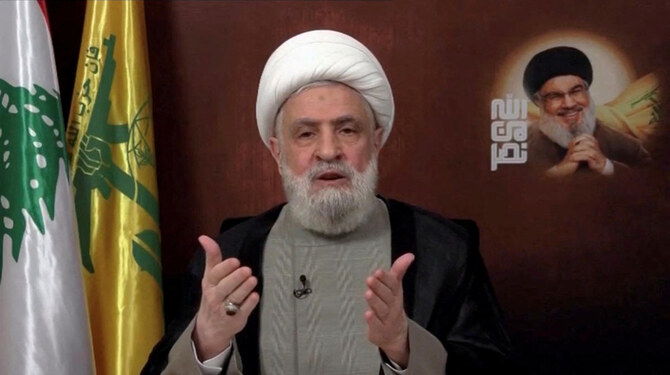BEIRUT: Lebanon’s Prime Minister Najib Mikati has condemned his Israeli counterpart Benjamin Netanyahu for appealing to UN chief Antonio Guterres to remove peacekeepers from the Lebanese side of the border, where clashes between Iran-backed Hezbollah and Israeli troops have intensified.
Lebanon “condemns Netanyahu’s position and the Israeli aggression against UNIFIL (UN Interim Force in Lebanon) peacekeepers,” said Mikati.
He added: “The warning that Netanyahu addressed to … Guterres demanding the removal of the UNIFIL represents a new chapter in Israel’s approach of not complying with international norms.”
Mikati’s statement came as Saudi Arabia officially launched relief air support to Lebanon, and the first plane carrying humanitarian and medical aid reached Beirut.
Rafic Hariri International Airport on Sunday witnessed the arrival of the first aircraft from the Saudi relief airlift, accompanied by the Saudi Ambassador to Lebanon Walid Bukhari.
The Saudi aid agency KSrelief announced that the airlift was established “under the directives of the Kingdom’s leadership to provide medical and humanitarian assistance to the Lebanese people in support of their efforts to cope with critical circumstances.”
The first aircraft carried 46 containers of various aid supplies, including tents, in anticipation of the approaching winter season.
The Saudi Press Agency also reported that KSrelief had continued implementing the fourth phase of the Hope Bakery charitable project in the Akkar Governorate and Miniyeh district in northern Lebanon.
During the past week the project has distributed 175,000 bundles of bread to families in need, including Syrian and Palestinian families, and host communities in northern Lebanon, benefiting 12,000 households.
The Lebanese Caretaker Minister of Economy Amin Salam; Caretaker Minister of Environment Nasser Yassin; and the Secretary-General of the Lebanese High Relief Commission Maj. Gen. Mohammed Khair welcomed the support’s arrival at the airport.
Yassin thanked Saudi Arabia “for this assistance in these challenging times to secure urgent needs. The Kingdom has consistently supported Lebanon, and we appreciate this stance and commitment.”
Bukhari, who met Mikati, said: “The first wave of assistance has arrived, confirming Saudi Arabia’s commitment and support for the Lebanese people in facing difficult challenges.”
A Qatari aircraft transporting tonnes of medical supplies also arrived at the airport, while an Omani aircraft, loaded with 40 tonnes of medicine and humanitarian assistance, is scheduled to arrive on Monday.
Meanwhile, Israeli airstrikes continued to target the Lebanese army.
A drone targeted a Lebanese army vehicle with a missile on Sunday as it passed through the town of Burj Al-Muluk, injuring three soldiers.
An airstrike on the town of Srebbine in the district of Bint Jbeil wounded four paramedics.
Meanwhile, UN peacekeepers in Lebanon on Sunday asked for an explanation from the Israeli army over what they said were “shocking violations” against their force, including forcing entry into one of their positions.
UNIFIL said in a statement: “We have requested an explanation from the Israeli army for these shocking violations.”
The organization also accused Israel’s military of halting a logistics convoy.
The UN peacekeepers said Israeli tanks broke through a gate to enter a Blue Helmet position in Lebanon on Sunday, after blocking their movement the previous day.
The peacekeeping mission said: “At around 4:30 a.m., while peacekeepers were in shelters, two Israeli military Merkava tanks destroyed the position’s main gate and forcibly entered the position in the Ramia area of southern Lebanon.
“They requested multiple times that the base turn out its lights. The tanks left about 45 minutes after UNIFIL protested through our liaison mechanism.”
A little over two hours later, peacekeepers reported “the firing of several rounds 100 meters north, which emitted smoke.”
They added: “Despite putting on protective masks, 15 peacekeepers suffered effects, including skin irritation and gastrointestinal reactions, after the smoke entered the camp.”
Israeli soldiers on Saturday had “stopped a critical UNIFIL logistical movement near Mais Al-Jabal, denying its passage,” the force said, referring to an area in south Lebanon.
“For the fourth time in as many days, we remind the IDF and all actors of their obligations to ensure the safety and security of UN personnel.”
The UN force added: “Any deliberate attack on peacekeepers is a grave violation of international humanitarian law and Resolution 1701.”
It added that UNIFIL’s mandate provided freedom of movement in its area of operations.
The number of peacekeeping soldiers in UNIFIL stands at 10,500, representing over 40 countries worldwide. They are deployed in fixed and mobile sites in the border area to monitor the implementation of Resolution 1701 in coordination with the Lebanese army.
Mikati on Sunday reaffirmed Lebanon’s commitment to Resolution 1701.
He said that Netanyahu “is not content with the aggression he is waging on Lebanon, claiming martyrs and victims and causing indescribable destruction.”
Mikati added that Netanyahu’s “warning to Guterres represents a new chapter in the approach of non-compliance with international legitimacy and its related resolutions.”
He added: “This statement is for the international community and the UN, and it should be a new incentive to take the appropriate stance after Netanyahu turned against the French-American call, supported by foreign and Arab countries, for a ceasefire.”
The southern front on Sunday witnessed new Israeli incursion attempts, especially in Maroun Al-Ras where Hezbollah announced its targeting of a gathering of Israeli soldiers inside the town.
The group also announced it had targeted an Israeli tank south of the Lebanese town of Qouzah with a guided missile.
A violent confrontation also took place at the entrance to the town of Ramyah, and machine-gun clashes were heard in an area between Aita Al-Shaab and Ramyah.
Israel’s Maariv newspaper reported that the Israeli army had captured a Hezbollah member in southern Lebanon and found an underground tunnel within a building that led to an area where other members of the group were present. Hezbollah-affiliated activists denied Israel’s claim.























